formerly eScholarship Editions


|
|
|
|
Your search for
'Classical History' in subject
and
Public
in rights
found 7 book(s). | Modify Search | Displaying 1 - 7 of 7 book(s) | |
| 1. | 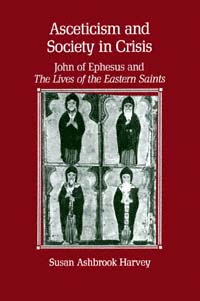 | Title: Asceticism and society in crisis: John of Ephesus and the Lives of the Eastern saints Author: Harvey, Susan Ashbrook Published: University of California Press, 1990 Subjects: Classics | Classical Religions | Classical History Publisher's Description: John of Ephesus traveled throughout the sixth-century Byzantine world in his role as monk, missionary, writer and church leader. In his major work, The Lives of the Eastern Saints , he recorded 58 portraits of monks and nuns he had known, using the literary conventions of hagiography in a strikingly personal way. War, bubonic plague, famine, collective hysteria, and religious persecution were a part of daily life and the background against which asceticism developed an acute meaning for a beleaguered populace. Taking the work of John of Ephesus as her guide, Harvey explores the relationship between asceticism and society in the sixth-century Byzantine East.Concerned above all with the responsibility of the ascetic to lay society, John's writing narrates his experiences in the villages of the Syrian Orient, the deserts of Egypt, and the imperial city of Constantinople. Harvey's work contributes to a new understanding of the social world of the late antique Byzantine East, skillfully examining the character of ascetic practices, the traumatic separation of "Monophysite" churches, the fluctuating roles of women in Syriac Christianity, and the general contribution of hagiography to the study of history. [brief] Similar Items |
| 2. | 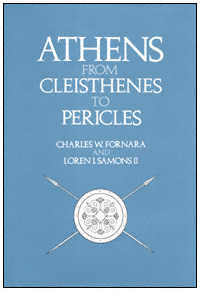 | Title: Athens from Cleisthenes to Pericles Author: Fornara, Charles W Published: University of California Press, 1991 Subjects: Classics | Classical History | Classical Politics Publisher's Description: By the mid fifth century B.C., Athens had become the most powerful city-state in Greece: a rich democracy led by Pericles that boldly gained control of an empire. Athens's strength under Pericles was the result of a complex interaction of events from the time of Cleisthenes. Fornara and Samons unravel the intricacies of the conflicting ancient sources to show how the development of both democracy and empire were interdependent in Athens's multifaceted evolution. The authors trace and contrast four stands of development: the history of the Alcmeonid family of Cleisthenes and Pericles, the nature and development of Athenian democracy, the growth of Athenian empire, and the burgeoning antagonism between Athens and Sparta. The fresh perspective thus afforded by this clear presentation will intrigue those with interests in both ancient economics and politics.The figure of Pericles is central to all four avenues of inquiry. His decision to create the enmisthos polis marked a fateful turn. Henceforth the democracy and the empire presupposed each other. Ultimately, Pericles's policies fueled Sparta's growing insecurity, resulting in her declaration of war on Athens in 431 B.C. and Athens's eventual fall. [brief] Similar Items |
| 3. | 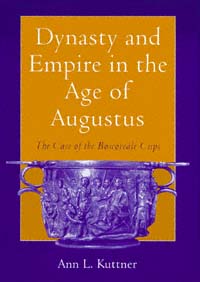 | Title: Dynasty and empire in the age of Augustus: the case of the of the Boscoreale Cups Author: Kuttner, Ann L Published: University of California Press, 1995 Subjects: Art | Art History | Classical History | Ancient History Publisher's Description: The two silver skyphoi commonly known as the Boscoreale Cups of Augustus and Tiberius are indispensable for providing the documentation of one of the only two cycles of Roman imperial state reliefs to survive from the Julio-Claudian period. Ann Kuttner offers the first comprehensive examination of these historical treasures.Kuttner studies the Cups not only from the standpoint of art history but also as they relate to Augustan ideology and politics. When she began work on this book, the whereabouts of the Cups was unknown, and she had to rely on the illustrations in Monuments et Memoires (Fondation Eugen Pinot, 1901). The rediscovery of the Cups at the Louvre in late 1990 has allowed Kuttner to examine them directly. [brief] Similar Items |
| 4. | 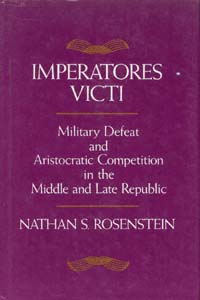 | Title: Imperatores victi: military defeat and aristocratic competition in the middle and late republic Author: Rosenstein, Nathan Stewart Published: University of California Press, 1990 Subjects: Classics | Classical History | Military History | Ancient History Publisher's Description: Given the intense competition among aristocrats seeking public office in the middle and late Roman Republic, one would expect that their persistent struggles for honor, glory, and power could have seriously undermined the state or damaged the cohesiveness of the ruling class. Rome in fact depended on aristocratic competition, since no professional bureaucracy directed public affairs and no salary was attached to any public office. But as Rosenstein adeptly shows, competition appears to have been surprisingly limited, in ways that curtailed the possible destructive effects of all-out contests between individuals. Imperatores Victi examines one particularly striking case of such checks on competition. Military success at all times represented an abundant source of prestige and political strength at Rome. Generals who led armies to victory enjoyed a better-than-average chance of securing higher office upon their return from the field. Yet this study demonstrates that defeated generals were not barred from public office and in fact went on to win the Republic's most highly coveted and hotly contested offices in numbers virtually identical with those of their undefeated peers.Rosenstein explores how this unexpected limit to competition functions, reviewing beliefs about the religious origins of defeat, assumptions about common soldiers' duties in battle, and definitions of honorable behavior of an aristocrat during a crisis. These perspectives were instrumental in shifting the onus of failure away from a general's person and in offering positive strategies a general might use to win glory and respect even in defeat and to silence potential critics among a failed general's peers. Such limits to competition had an impact on the larger problems of stability and coherence in the Republic and its political elite; these larger problems are discussed in the concluding chapter. [brief] Similar Items |
| 5. | 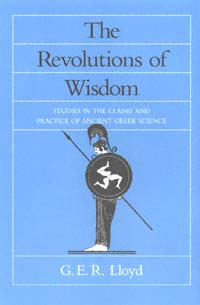 | Title: The revolutions of wisdom: studies in the claims and practice of ancient Greek science Author: Lloyd, G. E. R. (Geoffrey Ernest Richard) 1933- Published: University of California Press, 1989 Subjects: Classics | Classical History Publisher's Description: G.E.R. Lloyd's wide-ranging and historical study of the development of Greek science is a valuable contribution to current debates in the philosophy of language, on the analysis of scientific revolutions, and the rationality of science. Similar Items |
| 6. | 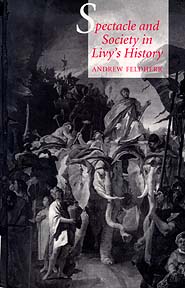 | Title: Spectacle and society in Livy's history Author: Feldherr, Andrew 1963- Published: University of California Press, 1998 Subjects: Classics | Classical Literature and Language | Classical History | Comparative Literature | Literature Publisher's Description: Public spectacle - from the morning rituals of the Roman noble to triumphs and the shows of the Arena - formed a crucial component of the language of power in ancient Rome. The historian Livy (c. 60 B.C.E.-17 C.E.), who provides our fullest description of Rome's early history, presents his account of the growth of the Roman state itself as something to be seen - a visual monument and public spectacle. Through analysis of several episodes in Livy's History , Andrew Feldherr demonstrates the ways in which Livy uses specific visual imagery to make the reader not only an observer of certain key events in Roman history but also a participant in those events. This innovative study incorporates recent literary and cultural theory with detailed historical analysis to put an ancient text into dialogue with contemporary discussions of visual culture.In Spectacle and Society in Livy's History , Feldherr shows how Livy uses the literary representation of spectacles from the Roman past to construct a new sense of civic identity among his readers. He offers a new way of understanding how Livy's technique addressed the political and cultural needs of Roman citizens in Livy's day. In addition to renewing our understanding of Livy through modern scholarship, Feldherr provides a new assessment of the historian's aims and methods by asking what it means for the historian to make readers spectators of history. [brief] Similar Items |
| 7. | 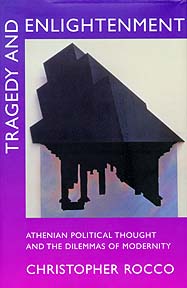 | Title: Tragedy and enlightenment: Athenian political thought, and the dilemmas of modernity Author: Rocco, Christopher 1958- Published: University of California Press, 1997 Subjects: Classics | Classical Philosophy | Classical History | Classical Literature and Language | Social and Political Thought | Social Theory Publisher's Description: Weaving together ancient Greek texts and postmodernist theory, Christopher Rocco addresses the debate between modernity and postmodernity that dominates contemporary theory. Interpreting Greek drama within a critical framework informed by contemporary theorists Foucault, Habermas, Horkheimer and Adorno, Tragedy and Enlightenment makes a sophisticated argument for the continuing relevance of the classical past, focusing on the subject of democracy.The starting point for Rocco's analysis is the impasse in contemporary political and cultural theory over the possibility and desirability of democracy in a postmodern world. After explaining the competing positions in the current debate, Rocco argues that ancient Greek tragedy and dialogue - specifically Sophocles' Oedipus , Plato's Republic and Gorgias , and Aeschylus' Oresteia - suggest alternate constructions for this and other postmodern problems.Rocco gives a detailed analysis of the contemporary divide over the theories of Jürgen Habermas and Michel Foucault and provides a provocative reading of Horkheimer and Adorno's Dialectic of Enlightenment. This original contribution to political and cultural discourse brings us to a new understanding of familiar texts and will alter the grounds of debate for students and scholars of the classical and the contemporary worlds. [brief] Similar Items |